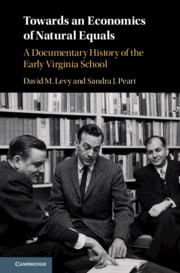2 results
3 - “Almost Wholly Negative”: An Early Reaction to the Virginia School
-
- Book:
- Towards an Economics of Natural Equals
- Published online:
- 16 December 2019
- Print publication:
- 02 January 2020, pp 41-92
-
- Chapter
- Export citation

Towards an Economics of Natural Equals
- A Documentary History of the Early Virginia School
-
- Published online:
- 16 December 2019
- Print publication:
- 02 January 2020

